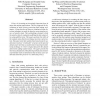Free Online Productivity Tools
i2Speak
i2Symbol
i2OCR
iTex2Img
iWeb2Print
iWeb2Shot
i2Type
iPdf2Split
iPdf2Merge
i2Bopomofo
i2Arabic
i2Style
i2Image
i2PDF
iLatex2Rtf
Sci2ools
114
click to vote
ICDM
2003
IEEE
2003
IEEE
On the Privacy Preserving Properties of Random Data Perturbation Techniques
Privacy is becoming an increasingly important issue in many data mining applications. This has triggered the development of many privacy-preserving data mining techniques. A large fraction of them use randomized data distortion techniques to mask the data for preserving the privacy of sensitive data. This methodology attempts to hide the sensitive data by randomly modifying the data values often using additive noise. This paper questions the utility of the random value distortion technique in privacy preservation. The paper notes that random objects (particularly random matrices) have “predictable” structures in the spectral domain and it develops a random matrix-based spectral filtering technique to retrieve original data from the dataset distorted by adding random values. The paper presents the theoretical foundation of this filtering method and extensive experimental results to demonstrate that in many cases random data distortion preserve very little data privacy.
Related Content
| Added | 04 Jul 2010 |
| Updated | 04 Jul 2010 |
| Type | Conference |
| Year | 2003 |
| Where | ICDM |
| Authors | Hillol Kargupta, Souptik Datta, Qi Wang, Krishnamoorthy Sivakumar |
Comments (0)

